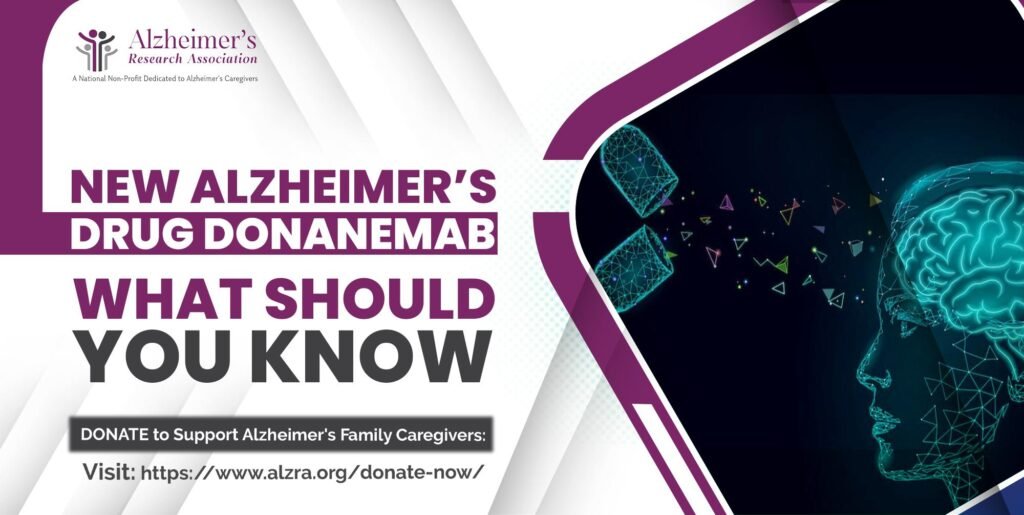The Food and Drug Administration approved donanemab, produced by Eli Lilly and sold under the brand name Kinsula, in July to treat individuals in the early stages of Alzheimer’s and those with mild cognitive impairment (MCI) [1].
Donanemab, marketed as Kisunla, is a monoclonal antibody that belongs to a novel family of Alzheimer’s drugs that aim to treat the disease pathology as it spreads across the brain rather than only treat its symptoms. For the past four years, clinics worldwide have conducted rigorous phase 2 and then phase 3 clinical trials of the medicine.
Here’s what you should know about donanemab.
Why is there such a demand for donanemab?
According to estimates, about 7 million Americans are living with Alzheimer’s, which ranked as the fifth most common cause of death for those 65 and over in 2021 [2].
Amyloid protein accumulation that forms a plaque in the brain is what causes Alzheimer’s disease. It impacts mental processes and muscle coordination. According to clinical trials, donanemab, while not a cure, can dramatically slow disease development. However, it cannot reverse memory loss or cognitive function decline.
Who is supposed to use the drug?
The FDA has approved the medication for individuals with early symptomatic Alzheimer’s, which includes mild cognitive impairment (MCI), as well as those with mild dementia who have verified amyloid plaque buildup. For those with moderate or severe Alzheimer’s, the medication is ineffective. It is also not recommended for people who have dementia from other causes.
Will this medicine restore lost memories or cognitive function?
There is currently no proof that this treatment, or any other, can stop memory loss or other cognitive impairments brought on by Alzheimer’s.
How does the drug work?
Donanemab is an anti-amyloid monoclonal antibody administered intravenously once a month. The drug’s antibodies bind to amyloid proteins and eliminate them.
What are the side effects?
Amyloid-related imaging abnormalities, which usually manifest as swelling and tiny bleeding patches in the brain, are among the medication’s side effects. In most cases, these side effects are discovered only by magnetic resonance imaging (MRI), and patients are unaware of them. Furthermore, infusion-related reactions may occur, such as flu-like symptoms like nausea, vomiting, and blood pressure changes.
What are the other factors that raise the risks?
Individuals with two copies of APOE-E4, a common gene variant that raises the risk of Alzheimer’s, are more likely to experience brain swelling or bleeding. Therefore, patients must have their APOE-E4 status checked before starting the medicine.
Medication that thins blood and is commonly prescribed by doctors to treat or prevent strokes may make you more susceptible to bleeding in the brain. These drugs stop the formation of blood clots. Find out from your doctor whether you take any medications that increase this risk.
How much does donanemab cost?
The annual cost of Kisunla treatment is $32,000. Some people may only require six months of medication, which would cost $12,522, while others may require eighteen months of medication, which would cost $48,696.
Brain scans and additional medical care required to monitor patients add to the cost. Medicare may cover all of the costs, depending on the patient.
How does donanemab differ from other monoclonal antibodies?
Although monoclonal antibodies that target beta-amyloid in the brain, such as aducanumab, donanemab, and lecanemab, fall into the same class of drugs, there are differences between them. They function differently by targeting beta-amyloid at particular stages of plaque formation, and ultimately, these treatments reduce beta-amyloid levels to halt disease progression and lessen clinical decline.
Alzheimer’s Research Association is a non-profit organization dedicated to helping caregivers of Alzheimer’s disease and dementia. We provide the latest information and news about the illness and helpful tips to help caregivers cope with their daily caregiving challenges. We realize the most important thing that a caregiver needs is financial assistance. Therefore, we provide grants to caregivers to ease their financial burden. Caregivers can apply for grants here: Alzheimer’s Grant Application.
You can also help caregivers in their endeavor by donating as much as possible: Donation To Alzheimer’s Research Associations.
References
- FDA approves treatment for adults with Alzheimer’s disease. U.S. Food and Drug Administration. https://www.fda.gov/drugs/news-events-human-drugs/fda-approves-treatment-adults-alzheimers-disease. Published Online: 2nd July, 2024. Accessed: 3rd September, 2024.
- Alzheimer’s Facts and Figures. Alzheimer’s Association. https://www.alz.org/alzheimers-dementia/facts-figures. Accessed: 3rd September, 2024.
- New Alzheimer’s drug in demand but who should take it? Tampa Bay Times. https://www.tampabay.com/news/health/2024/08/22/alzheimers-fda-donanemab-dementia-medication/. Updated: 28th August, 2024. Accessed: 3rd September, 2024.
- What Should You Know About Kisunla, The Newly FDA-Approved Alzheimer’s Drug. Alzheimer’s Research Association. https://www.alzra.org/blog/kisunla-newly-fda-approved-alzheimers-drug/. Published Online: 9th August, 2024. Accessed: 3rd September, 2024.
- Donanemab Approved for Treatment of Early Alzheimer’s Disease. Alzheimer’s Association. https://www.alz.org/alzheimers-dementia/treatments/donanemab. Accessed: 3rd September, 2024.







More Stories
Is Zytiga Generic Right for You? A Patient’s Guide
Key Facts About Triple-Negative Breast Cancer
Comments and Questions After Your Liposuction